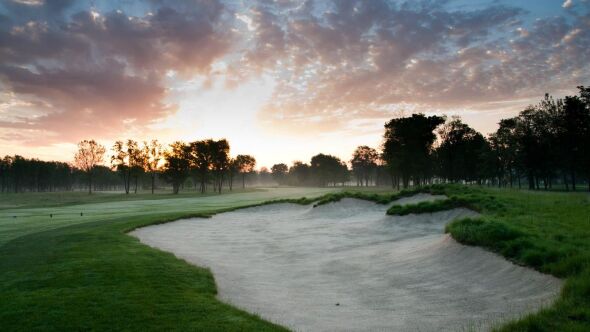It was a weird weekend, but there were plenty of reasons for hope if you're a golf nut.
The PGA Tour's RBC Canadian Open final round was an absolute delight. The final threesome of Rory McIlroy, Justin Thomas and Tony Finau treated viewers to a display of spectacular golf on a classic course, with McIlroy needing to shoot 62 to hold off the other two.
But as satisfying as it was, the PGA Tour's product was only highlight #2 of my golf weekend. The top spot goes to an hour-long range session I got to spend at my home course Sunday morning. I didn't win millions of dollars, I wasn't ferried to and from the tee in a British taxi and to be honest, I didn't even hit that many good shots. But no matter how well the Rorys and Justins play, no matter how much they entertain me when I'm on my couch, and no matter how much money the more venal pros play for on rogue upstart tours, no one will interest me as much as my favorite golfer: me.
I suspect you agree. Whether you have a passing or passionate interest in watching other people play golf, nothing matches the maelstrom of emotions that swirl around your own first-hand experience of the game.
The game of golf, not the sport.
The sport of golf is what you see on TV. It can often be captivating, as it was Sunday, not to mention lucrative for those directly involved. But in the end, the sport of golf is a commercial product developed and calibrated to convert our capacity to be entertained into ever-rising tournament purses, broadcast rights fees, advertising revenue and executive compensation.
The game of golf is far more personal and unique to each person who plays it. It's time with family and friends, time in nature, opportunities to compete even for small stakes, a platform for human connection and the fostering of values like integrity and diligence. It has its own commercial elements, sure, but they're more varied and adaptable to our own aspirations.
The game and the sport of golf are connected, but make no mistake: the sport relies on the game, and not vice versa. If the sport suddenly ceased to exist, the game would go on as it has for centuries. The ongoing disruption of the sport of golf, thanks to the Saudi Arabia-backed LIV Golf organization, is alternately intriguing and upsetting, but it will eventually settle out, and in the end it will have little to no effect - thank goodness - on the game of golf. The success or failure of the LIV Golf tour has zero to do with the sanctity of your Saturday morning game, except as fodder for conversation.
Golf is different from most other popular athletic pursuits in that millions of people who habitually watch its elite version on television also happen to play it themselves. Take, for counterexample, the NFL. A tiny portion of people who watch the Super Bowl have ever strapped on pads and bashed their bodies into others at the line of scrimmage. The vast majority of us have no hope of hoisting three-pointers with the ease of Stephen Curry in the NBA Finals. We cannot and will never smash 98-mile-per-hour fastballs out of ballparks like Aaron Judge does with regularity. The attraction of these spectator sports lies in the fact that most lay fans cannot identify with the experience of playing it themselves.
Golf's appeal is the opposite; context is crucial to understanding. People who don't play the game almost always underestimate how difficult it is. They don't get how mind-blowingly good Justin Thomas is at hitting pinpoint wedge shots, or just how closely Rory McIlroy's ability to drive the ball so far and so straight resembles a superpower. Playing the game ourselves binds us to the efforts of the most famous golfers to do the same and gives us an appreciation that makes us watch.
But in the end, all else being equal, where would we rather be: on the couch or in the arena? I reckon that the vast majority of us would choose the latter, with occasional exceptions like this coming Sunday's U.S. Open final round and the conclusions of the other major championships.
Even so, the strongest urges I have to go play golf or practice always come after watching a thrilling tournament on TV because at the end of the day, I care about my own game most of all. After enjoying the sport of golf, I still desire the game more than anything else. No shotgun starts, no made-up team format and no amount of $4-million, first-place prizes will ever change that fact.

 Back
Back














